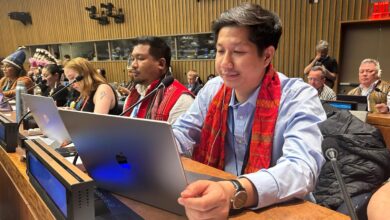Three deficiencies of indigenous entrepreneurs of CHT: Capital, Training, and Planning

Satej Chakma, Chief Reporter: Building up and sustaining entrepreneurs within a weak socio-economic structure, distinct lifestyle, and traditional economic system, characteristic to 11 indigenous communities of Chittagong Hill Tracts, is pretty hard. In this reality, the black shadow of Covid-19 is also quite visible. Due to the shock of Covid-19, many lost their jobs and were forced to change professions and as a result, the number of poor has increased in the Chittagong Hill Tracts (CHT).
According to a survey conducted in 2009 with the assistance of UNDP-CHTDF, the absolute poverty rate among hill indigenous people (IPs) is 65% and the extreme poverty rate is 44%, while Bangladesh Bureau of Statistics shows the national extreme poverty rate is 10.5% (2019).
In addition, about 3/4 of indigenous families in CHT, 74% of which are living below the low poverty line, the UNDP said in the report. However, with regard to the implementation of government and NGOs initiatives and development plans, this figure has definitely changed in 2021.
A research booklet titled ‘Achieving the SDGs in CHT: Challenges and Opportunities’ published by the International Center for Mountain Development and the Ministry of Chittagong Hill Tracts affairs in 2016 states that ‘the poverty rate is high in Chittagong Hill Tracts due to low occupational diversity and over-dependence on agriculture’. Besides, the survey conducted by UNDP also shows that only 3% of the CHT IPs are engaged in varied trades and 3.5% are engaged in paid employment. After a decade, this rate will also go up for a bit, but experts feel that it is necessary to create new job opportunities and initiatives to reduce the pressure on the increasing population and limited land.
Conversing with 8 women and 12 men entrepreneurs from different indigenous communities of three hill districts involved in many types of small-large and medium-scale enterprises, various associated challenges have been revealed. These entrepreneurs included agribusiness entrepreneurs, resort traders, women entrepreneurs related to e-commerce, grocery store owners, shipping owners, freelancers, ‘Jum’ (shifting cultivation) farmers, and even some unemployed youths the reporter spoke to.
Donwai Mro (22), studying at University of Dhaka, opened a small shop near his house in Chimbuk, Bandarban, and sold various fruits, tea, coffee, and other items to tourists during the university closure. Regarding the status of the venture, Donoai said, “I don’t have a precise account of how much has been earned so far, even though I started this initiative with borrowed money and turned it into a permanent shop house.” Considering the scarcity of capital and family, and social pressures in job arrangement he expresses doubt about the sustainability of his initiative.

The above twenty entrepreneurs informed the reporter that their main problems are – capital, inadequate training and lack of planning. But apart from these crises, lack of government or private incentives; difficulties in communication systems; they blame the absence of planning and adequate incentives by administrative institutions for entrepreneurs as well as the lack of quality education.
However, Ranajyoti Chakma, associate professor of Rangamati University of Science and Technology and chairman of Pro-Better Living Ltd., which works with entrepreneurs in CHT, points out four key barriers to entrepreneurs in the hills. He said, firstly, the deep-rooted misconception that hill people cannot conduct business, secondly, family constraints, and thirdly, lack of capital. Moreover, the fourth challenge, even if capital is managed, is their lack of specific guidance support and business plans. For which this academician thinks they drop out.
IPs are not used to the banking system
Most of them have no knowledge and connection with the banking system due to their unique traditional life and economic system. Rangamati Science and Technology University teacher Ranajyoti Chakma said in this context, “the indigenous peoples of CHT do not even want to open a bank account.”
When asked about various loans or incentives provided by various private institutions including banks, most of the entrepreneurs said that they were not aware of it. They don’t even know that in recent times loans from SME Foundation to small and medium entrepreneurs are being provided as incentives ranging from 1 lakh to 75 lakh through banks. And those who know are either unable to fulfill the conditions of obtaining the loan or unable to take the loan due to the complexity of the process.
In this context, Ranajyoti Chakma also added that the bank gives loans after seeing the details of the entrepreneur’s financial management and how many conditions are subject to fulfillment. Indigenous entrepreneurs are not used to the process, transactions and updating of income and expenditure accounts through checks even if the conditions are met.
However, Lelung Khumi, a development worker in Bandarban, said that the policymakers working in the banking sector are not experienced with the traditional life system of the IPs. They are unable to formulate indigenous-friendly policies and are lagging behind in getting these loans as they are not used to the new process due to the IPs unique traditional way of life.
Lack of proper planning by administrative authorities:
Meanwhile, Gaurav Dewan, who has been involved in the tourism resort and restaurant business in CHT for a long time, said that the administrative institutions do not have proper policies and guidelines for the entrepreneurs in CHT. People from the plains visit Rangamati to see the beauty of Kaptai Lake. But the way the lake is getting dirty and the lakeside houses are being built, this beauty will disappear in the next ten years. And without the preservation of this beauty, the resort and tourism business is impossible.
On the other hand, on the way to the resorts, Gaurav Dewan stated that the tourists were disappointed because they were not getting other services as expected by the law enforcement agencies at various times.
Inadequate training, inconsistencies, and weaknesses in training design:
Lack of adequate training is another major challenge for entrepreneurs. A research survey conducted by ILO and Bangladesh Institute of Development Studies (BIDS) in 2017 stated that 73.13% of IPs in CHT do not have minimum skills to perform ‘simple tasks’. In this regard, Gaurab Dewan said, Long ago Rangamati Hill district council arranged some training for entrepreneurs but now I have not heard that such training has been organized. And the training organized by various organizations is more theoretical than practical.
On the other hand, the design of the training is inconsistent with the educational qualification and background of the indigenous entrepreneurs, said Ranajyoti Chakma, teacher at Rangamati University of Science and Technology.
He said that most of the students are lacking in basic education and they do not understand the teachings of training due to the appointment of teachers through bribery or question fraud instead of qualification in the primary level of district councils of 3 hill districts.
Difficulty in getting adequate price and communication:
In the meantime, the farmers of Rangamati and Khagrachari informed that in the previous season, the price of pineapples was 10 taka each, and even up to three pineapples were sold at a minimum price of 10 taka. Again, an agricultural entrepreneur named Sushant Tanchangya of Rangamati Sadar Upazila told Indigenous Peoples News, Bangladesh that except during the monsoon season, there is no water in the lake, so he has to carry pineapples, jackfruits, or other crops to the market on either his shoulders or on the back with much difficulty. It also costs more labor expense. Still, it feels bad if we don’t get enough prices in the market.
Also, the entrepreneurs further said that due to market closedown and other problems because of instability of the political situation, the crops are destroyed.
Non-implementation of the CHT Accord and weakness of administrative structure:
In addition to all the above factors, the fundamental factor hampering all kinds of business ventures in CHT is the administrative weakness and various crises caused by the complete non-implementation of the CHT Accord. In this regard, in a conversation with this reporter, prominent political economist, and professor of Dhaka University, Abul Barkat said, In my view, Entrepreneurship Development (ED) in the real sense of the term in the CHT is impossible without the full implementation of the CHT Accord-1997, including the complete resolution of the last about 70 years of grabbing of indigenous people’s land, settlement and forest by the Non-indigenous peoples,army and the Forest Department. ED in CHT is impossible without well-coordinated devolution of power and authority to the CHT Regional Council, 3 hill District Councils, and IPs at large. So long, CHT will continue to be treated as a disturbed area (like Kashmir or equated with the 7-sisters of India) the question of ED in CHT would remain a misnomer. ED in CHT is not an economic issue; it is, without any ambiguity, a political issue.
This view was reiterated by Gaurav Dewan, an entrepreneur involved in the tourism business in the hills for a long time. According to him, if the administration was conducted by actual representatives when the accord was implemented, everything would have been accomplished according to plan and both business opportunities and the environment would have been built.
In this context, Dr. Abul Barkat added that entrepreneurship development in the hills is not possible without decentralization of power in the hands of Chittagong Hill Tracts Regional Council and three district councils, integrated coordination, and allowing IPs to work independently.
Meantime when contacted to inquire about various measures taken for entrepreneurs, it was reported that none of the three hill district councils have any specific policies. In this regard, Titon Khisa, Chief Executive Officer of Khagrachari Hill District Council said, the council has no policy concerning entrepreneurs. In the last four years, I have not seen any kind of support and training provided to entrepreneurs too.
When asked about this issue, the administrative officer of Bandarban Hill District Council U Chi Mong said that there is no integrated policy. But when the work is done on a project basis, it is mentioned who will get it, and how they will get it. This is happening due to various limitations of the district council.
He said, now people are doing various things for socio-economic development. So many people are interested in getting various types of training and incentives. But we cannot support that way accordingly. Because there is only one admin against four posts and only three engineers against 7 posts. It is not possible with this small number of manpower.
Aranendu Tripura, the public relations officer of Rangamati Hill District Council stated that the training was organized by their subordinate organization BISIC and Youth Development board. But there is no such specific policy of their council. Referring to the concept of ‘entrepreneur’ as a ‘new concept’, he also said that “there is no one who will think about this issue or take action in the current council structure. Incentives and budgeting for them or connecting them with banks, nobody really thinks about it yet.



